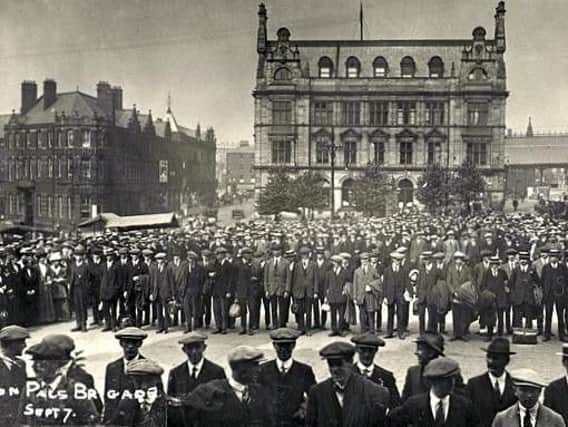How 100 years ago Preston remembered its sons killed in the First World War


On August 31, 1914 an advert appeared in the pages of the Lancashire Daily Post, appealing for men to sign up for nation’s war effort. Within a week, enough recruits had come forward to form what would become D Company, of the 7th Battalion,of the Loyal North Lancashire Regiment more commonly known by their nickname the Preston Pals.
On September 7, the 221 Pals marched through Preston to the railway station where they left for training in the south of England, before being sent to France for the first time in July 1915. For many of the men they would never return to their home town again.
Advertisement
Hide AdAdvertisement
Hide AdOne hundred years ago this week, around 50 surviving members of D Company paraded in the Market Square before marching to Preston’s Parish Church for a special ceremony to remember their fallen comrades.
Among their number was Captain Cyril Cartmell, whose father was Mayor of Preston Alderman Harry Cartmell, the man who had placed the advert in August 1914 for those volunteers who would form the Preston Pals.
The service was conducted by Rev Leslie Forse, who had been the chaplain of the 1/4th Loyals until his capture by the Germans on April 9, 1918 during the Battle of Estaires.
A Cambridge graduate, he had been engaged on the battlefield with his batman and a regimental doctor during a five-hour bombardment when a group of Germans appeared from dense fog and took the three of them prisoner and they were taken to be held at Heidelberg.
Advertisement
Hide AdAdvertisement
Hide AdThe former curate of Fleetwood Parish Church and South Shore Parish Church, Blackpool, had been repatriated the day before the war ended in November 1918 and was officially demobilised on September 13, the day before the remembrance service for the Preston Pals.
Rev Forse described how he first met the men during their training in Tidworth, in Wiltshire, in 1915, where their “indomitable cheeriness, fiery enthusiasm and keen desire to fit themselves speedily for the duty for which they had joined, endeared them to all”.
But he also recalled the company’s first casualties of the war at The Apex, Canadian Orchard, when, “only their officers knew how keen and fearless were these lads from Preston in every fight”.
Rev Forse added: “No wonder that the toll they paid was heavy when their duty was always nobly and valiantly done. Preston had good reason to be proud of her sons. Those who were left would remember with pride those who had gone.”
Advertisement
Hide AdAdvertisement
Hide AdOn the Somme, in particular, the Pals made their mark and while he was a prisoner in German Rev Forse recalled hearing highly-placed German officers declare that English troops had won the war on the Somme and had made it impossible for Germany to hope for victory from that point in.
Rev Forse added: “Those who had made the supreme sacrifice for the freedom of their country were looking to those who had been spared to remember that they had dedicated their whole lives to make England a fairer land for the generations to come, and it was for them to sacrifice every hour for this great end, and not seek personal pleasure, ease and profit out of the dead bones of dear comrades who had died gladly for their country’s freedom.”
At the close of the ceremony, a squad of trumpeters from the garrison at Fulwood Barracks sound the Last Post.
The following year, Rev Forse was one of the first veterans to return to the former battlefields in France, after travelling with Preston war hero Major Arthur Houghton MC to investigate plans for a memorial for the 4th Battalion, of the Loyal North Lancashire Regiment, also known as the Preston Rifles.
Advertisement
Hide AdAdvertisement
Hide AdHe reported back to say life was well on its way to returning to normal, with the French and Belgians working 14-16 hours a day on rebuilding and manufacturing.
Many of the trenches had been filled in and whole new towns constructed in a ‘neatly built up-to-date style’ with fields of brick kilns serving the rebuilding work while the cemeteries were looking good.
And Rev Forse had a remarkable chance encounter with a batman who had served him while they were both held as prisoner of war. He was on a train when he spotted the man, a French coalminer, from the window and the two exchanged greetings before the train departed.